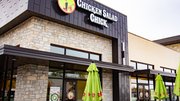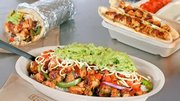Article
Which Wich founder tells Summit attendees: 'If you can't dazzle them with brilliance, BS them until you both believe it'
Jeff Sinelli learned early in life a few lessons that helped him pursue his dreams and not be afraid to get out of his comfort zone. He also learned the importance of being true to his values and a commitment to helping those in need.

March 30, 2017 by Elliot Maras — Editor, Kiosk Marketplace & Vending Times
The Restaurant Franchising and Innovation Summit got off to an engaging start Tuesday as Jeff Sinelli, founder and CEO of Which Wich Superior Sandwiches, gave an inspirational account of the lessons he learned in his journey from humble beginnings to running a 500-store sandwich chain.
He learned to be unafraid of his dreams, even though his path to success did not come without its share of challenges. He founded and built Genghis Grill into a success, for example, but a "friend" took it out from under him after he admittedly "took his eye off the ball."
That experience and many others taught him that success requires going out of your comfort zone and daring to "dazzle" or at at least "bullshit them enough" until you both believe it.
Early lessons
Sinelli traced his love for food to his early childhood watching his grandmother cooking in the family’s home and taking him to a bakery on Saturdays. He later learned that his grandmother was buying subsidized cheese and bread bought on credit for the sandwiches that he and his family ate.
One lesson his grandmother taught was, "when you make something, make it with love. It tastes better."
When he was 11, he set up a lemonade stand at a farmers market. A farmer told him to leave a can for tips. At the end of the day, he sold no lemonade but had $100 in tips.
While in college, he wasn’t an outstanding student, but he was successful buying and reselling football tickets.
"I learned how to hustle," he said. This was a valuable lesson for his business career. "You’ve always got to be on the hustle," he said. "If you can’t dazzle them with your brilliance, dazzle them with your bullshit."
A flare for entrepreneurship
While Sinelli did not make good grades as an undergraduate student, he pulled a 4.0 in his MBA program. Anxious to make his mark in business, he went to Dallas and opened a bar/nightclub in a burned out building and got his first taste of entrepreneurship. He went into debt when he had to close the club for the winter months.
But come spring, he quickly rebounded.
When an art festival came to town, Sinelli sold more beer in four days than the festival promoter made. He paid off his debts and opened another nightclub.
His second nightclub taught him another business lesson. At first, he didn’t know if he would be able to cover his $3,000 monthly rent. So he put his parking lot up for rent and got a bid for $3,500 per month, covering his rent and an extra $500.
"You’ve got to be a salesperson," he said.
Fast success turns sour
Sinelli got into the restaurant business in 1998, when he opened the Genghis Grill. The business became a fast success, and Sinelli found himself living the high life.
But he had not paid close attention to all of his obligations, and one day he found he could not meet his payroll.
"I took my eye off the ball," he said, "The shoe dropped."
A person he thought was a friend offered to provide the money he needed, but the loan carried a stipulation that eventually cost Sinelli the business.
"It got very dark for me," he said. "It was one of the worst things that happened to me."
In his time of distress, his wife made him peanut butter and jelly sandwiches.
Inspired by the peanut butter and jelly and sandwiches, he came up with the idea of a sandwich shop. When he called property owners to lease him space for his sandwich shop, no one wanted to lease him space for such a concept considering that Subway was a better bet.
Nonetheless, he made up business cards for Which Wich and attended the National Restaurant Show.
The value of business cards
Sinelli’s concept wasn’t much more than that at the time, but after the restaurant show, he got a call from a writer for a foodservice trade magazine who had received one of his Which Wich business cards. The writer was intrigued by the concept and wanted to do a cover story, which turned into a seven-page spread on a concept without even one unit.
Sinelli told his listeners the life-changing event taught him the importance of carrying a business card. Without it, the article never would have been published.
Encouragement from a legend
Fred DeLuca, founder of Subway, was so impressed by the article that he called Sinelli and wanted to meet him. Sinelli was flattered. DeLuca told him to stick with his vision and not get sidetracked.
"I realized that anything was possible," he said. "It really is if you believe it."
Which Wich opened its first store in Dallas in 2003. Two years later, the first franchise store opened. The company now has stores in most U.S. states and on several continents.
A great cause
Early on in developing Which Wich, Sinelli wanted his brand to help others. He started making free peanut butter and jelly sandwiches to the needy and quickly built Project PB&J.The chain's charitable arm fights hunger by donating two of the fruit-and-nut sandwiches for each sandwich sold in Which Wich stores.
"You can do well by doing good," he said. "You have to practice what you preach. I told our team we’re going to start living our values."
After Sinelli's keynote, he led the Summit attendees in a "Spreading Party," where they split up into teams and made as many peanut butter and jelly sandwiches as possible in one hour. The final count was 10,201, which fed some of the homeless people living in Dallas.
Register here for the Restaurant Franchising & Innovation Summit, July 18-20 in London. The 2018 RFIS will be in April in Louisville.
About Elliot Maras
Elliot Maras is the editor of Kiosk Marketplace and Vending Times. He brings three decades covering unattended retail and commercial foodservice.
 ChatGPT
ChatGPT Grok
Grok Perplexity
Perplexity Claude
Claude












